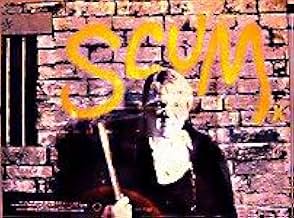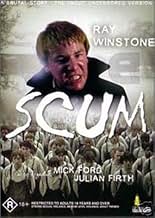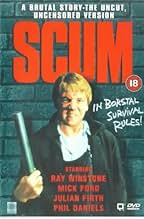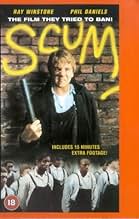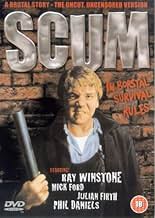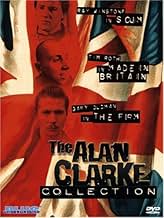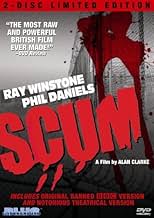An uncompromising story of life in a British juvenile offender institution in the '70s.An uncompromising story of life in a British juvenile offender institution in the '70s.An uncompromising story of life in a British juvenile offender institution in the '70s.
Philip DaCosta
- Jackson
- (as Philip Da Costa)
- Director
- Writer
- All cast & crew
- Production, box office & more at IMDbPro
Featured reviews
I have seen this film once, and that should be enough for many people, yet they probably will have an urge to see it again and see the actors who are now making bigger, slicker movies (Cat off Red Dwarf in Blade 2 and Ray Winstone in everything!)
As it is about people around my age, this film hit me even harder. The rape scene counts as being the most sickening scene in movie scene history, yet it is all integral to the story. It is extremely bloody, racist and yet moving and heartbreaking. Ray Winstone is a cruel revelation as a top dog,a sympathetic yet violent hoodlum. Never been better since, I think.
The film moves at a breakneck speed and never seems to sag. I don't know what those employed at a borstal will think of it, but it would probably make them think more of the broken-down urchins as human.
A hard film to like, but even harder to forget. If I was rating it, a 3/5. I think I would give it a five if it wasn't so stomach-churningly realistic. Violence in films can be entertaining, but on no account this time.
As it is about people around my age, this film hit me even harder. The rape scene counts as being the most sickening scene in movie scene history, yet it is all integral to the story. It is extremely bloody, racist and yet moving and heartbreaking. Ray Winstone is a cruel revelation as a top dog,a sympathetic yet violent hoodlum. Never been better since, I think.
The film moves at a breakneck speed and never seems to sag. I don't know what those employed at a borstal will think of it, but it would probably make them think more of the broken-down urchins as human.
A hard film to like, but even harder to forget. If I was rating it, a 3/5. I think I would give it a five if it wasn't so stomach-churningly realistic. Violence in films can be entertaining, but on no account this time.
The grandaddy of 'incarceration' films - this is one of the best, oft copied but never bettered.
I liked it because it's so damn British. The one liners are legion; you all know what they are and where, but among a stellar list 'Mecca, Archer' rises just above and never fails to have me in fits. The way Goodyear looks at the Governor just after this great outburst is also revealing; as is the look of satisfaction on Archer's face when he finally succeeds in riling the 'religious maniac'.
Of course, there's a serious message in here; expedited best in the conversation between Archer and Mr Duke over 'coffee'. Analysing the situation, as Archer attempts to do, will simply not be tolerated and is interpreted as dissent by a man who embodies the 'system' and is intellectually and emotionally unequipped to deal with his own, and the State's ultimate failure to deliver.
Like true class acts, this film works on several levels; it's a no nonsense drama bedecked with Taj Mahal one liners everyone loves, yet it also works on a deeper level; you cannot punitively 'correct' all offenders with violence and cruelty. You are not corrected, you are merely broken, as Davis and Toyne are. If you're not broken, you run amok, but the point is you're not 'cured'.
When this film was on TV in 1983, just after Channel Four started broadcasting, they edited the notorious potting shed sequence to such an extent that the heinous act committed was virtually excised, thereby diluting the dramatic effect to virtually zero. Interestingly enough, they also edited out the bit where Mr Greaves ignores Davis' second press of the bell. Why? Presumably because they feared the ire of the State at the highlighting of its inadequacies? I suppose they can be forgiven, Channel Four was new then after all, but it's quite revealing nonetheless.
If I'm home alone, I quote this film as I'm wandering around the house. I don't quite know why. It's all about the importance of individuality, standing up for yourself and not just 'accepting' things. That's probably the reason. Now, where's your tool?
I liked it because it's so damn British. The one liners are legion; you all know what they are and where, but among a stellar list 'Mecca, Archer' rises just above and never fails to have me in fits. The way Goodyear looks at the Governor just after this great outburst is also revealing; as is the look of satisfaction on Archer's face when he finally succeeds in riling the 'religious maniac'.
Of course, there's a serious message in here; expedited best in the conversation between Archer and Mr Duke over 'coffee'. Analysing the situation, as Archer attempts to do, will simply not be tolerated and is interpreted as dissent by a man who embodies the 'system' and is intellectually and emotionally unequipped to deal with his own, and the State's ultimate failure to deliver.
Like true class acts, this film works on several levels; it's a no nonsense drama bedecked with Taj Mahal one liners everyone loves, yet it also works on a deeper level; you cannot punitively 'correct' all offenders with violence and cruelty. You are not corrected, you are merely broken, as Davis and Toyne are. If you're not broken, you run amok, but the point is you're not 'cured'.
When this film was on TV in 1983, just after Channel Four started broadcasting, they edited the notorious potting shed sequence to such an extent that the heinous act committed was virtually excised, thereby diluting the dramatic effect to virtually zero. Interestingly enough, they also edited out the bit where Mr Greaves ignores Davis' second press of the bell. Why? Presumably because they feared the ire of the State at the highlighting of its inadequacies? I suppose they can be forgiven, Channel Four was new then after all, but it's quite revealing nonetheless.
If I'm home alone, I quote this film as I'm wandering around the house. I don't quite know why. It's all about the importance of individuality, standing up for yourself and not just 'accepting' things. That's probably the reason. Now, where's your tool?
Be warned that you should go into this film with your guard up. By the time the final scene has faded quietly out, you will probably be in a state of shock.
The film details life in a Borstal institution and the violence and racial hatred that runs rampant through both the prisoners and their wardens. There is nothing cheery here at all and that is precisely the point. Director Alan Clarke deliberately films with a documentary style and it is this realism that makes the film so shattering. Scenes of sexual and racial abuse are placed in front of the camera and no raw nerve is spared the touch of the film.
It should be shown to youngsters as a reason not to turn to crime.
The film details life in a Borstal institution and the violence and racial hatred that runs rampant through both the prisoners and their wardens. There is nothing cheery here at all and that is precisely the point. Director Alan Clarke deliberately films with a documentary style and it is this realism that makes the film so shattering. Scenes of sexual and racial abuse are placed in front of the camera and no raw nerve is spared the touch of the film.
It should be shown to youngsters as a reason not to turn to crime.
I've now seen this movie several times, although admittedly watching it can hardly be classed as a 'pleasure'. Alan Clarke made this feature after his TV play from two years earlier was banned, and perhaps had more freedom here to explore the issues.
Carlin (an early, showy appearance from Ray Winstone) is sent to Borstal where he quickly establishes himself as a tough boy with a regime of strength. Typical Winstone performance in many ways. In the prison with him are his shadow Richards (played by Phil Daniels); cynical, bare-footed Archer (Mick Ford, these days more often seen the other side of the law in such dramas as 'Silent Witness'); black inmate Angel (Davidson Knight); and quiet Davis, the boy who gets picked on for being a loner (a quite staggering performance from Julian Firth, who never really lived up to this early promise).
Scum is uncompromising - violent (there's a rape which leaves little to the imagination, a suicide, several fights); scathing in its condemnation of the 'system' (which thankfully is not like this now) - and yet finds time for character development and convincing plot. Without any music it is purely presented in documentary style, matter-of-fact 'this is how it is'.
Not a fun movie, but one which tries to make a point, and, if nothing else, has the power to shock and make you remember certain sections for a long time after viewing. Recommended.
Carlin (an early, showy appearance from Ray Winstone) is sent to Borstal where he quickly establishes himself as a tough boy with a regime of strength. Typical Winstone performance in many ways. In the prison with him are his shadow Richards (played by Phil Daniels); cynical, bare-footed Archer (Mick Ford, these days more often seen the other side of the law in such dramas as 'Silent Witness'); black inmate Angel (Davidson Knight); and quiet Davis, the boy who gets picked on for being a loner (a quite staggering performance from Julian Firth, who never really lived up to this early promise).
Scum is uncompromising - violent (there's a rape which leaves little to the imagination, a suicide, several fights); scathing in its condemnation of the 'system' (which thankfully is not like this now) - and yet finds time for character development and convincing plot. Without any music it is purely presented in documentary style, matter-of-fact 'this is how it is'.
Not a fun movie, but one which tries to make a point, and, if nothing else, has the power to shock and make you remember certain sections for a long time after viewing. Recommended.
Alan Clarke first released Scum in 1977 as a BBC TV-film, yet the BBC disapproved of the film due to the amount of raw, harrowing realism which had been packed into a short running-time. Therefore the BBC banned the version, and it was not until fifteen years later that the TV-version was aired on the UK's Channel 4. Though, to get around not being able to release the TV version of Scum Alan Clarke opted in for developing a remade, feature-length version to be aired at cinemas, this was released in 1979. The film sent shockwaves through cinemas across Britain, causing huge controversy from the media, government and British public. Some people saw the film as a "visceral image of a flawed system", while others saw the film as "exploitive trash in the form of a documentary".
Scum is a disturbing look at a British Borstal's futile attempt at rehabilitating young offenders, the inmates of the Borstal range from adolescent teen to young adult. Most of them (if not all) have little hope in achieving anything in their life, except for just moving from prison to prison for their antisocial crimes. The film focuses of on brutality of a flawed and corrupt system whereby the inmates have no hope of rehabilitation due to the infantile regimes. The film shows how survival through brutality is the only way of getting through the system and even then there is still no sign of release for any of the prisoners. Thankfully in today's Britain, Borstals are inexistent, since they were (as is quite apparent in Scum) deemed unfit for people, due to the despicable infliction of violence and vicious corruption.
Scum is undoubtedly a film which will prompt viewers to question to entire rehabilitation process used for society's undesirables. Scum makes you wonder whether it is morally incorrect for even the most disgusting of individuals to get such vile treatment. As the brutal treatment is only prompting the individual to become even more sadistic and inhumane. The film details what men will do to "comply" with a system they loathe and how they will form their own rules and beliefs to suit the system in a way which will benefit them. There is a strong element of wasted talent etched into the film, this is in the respect of intelligent men who have potential, yet do not know how to use it. Scum takes you inside a world where young men have been reduced to their most primitive form; a place where violence breeds violence and respect is shown through class and power, rather than morals. I beg of you to think about what Scum is attempting to say and question through its subtext.
The performances from the entire cast are pulled off with raw, natural intensity. Ray Winstone's debut performance as nicknamed "the daddy"- Carlin is one of the most unflinching and uncompromising performances I have ever seen. It is a performance which bursts with adolescent rage and masochism. He is a boy who has been demoralised by the life he has grown up in. It is distressing to see a man of complex capabilities be destroyed by his primitive brutality, which has been forced upon him by the human instinct of survival.
The technical prowess of Scum helps to create and delve inside the bland, grim and unpleasant environment of the Borstal. Making the film feel even more genuine in its atmosphere through its documentary style editing and camera techniques, the use of long-haul, close-ups and tracking-shots add to the film's aggressive ingenuity. In some of the more violent scenes of the film the camera is held for longer takes, which helps to provoke more emotional power. The camera feels somewhat intrusive, this is because of how Alan Clarke is achieving to shed light on a conformity situation people were afraid to question and examine, yet Alan Clarke is unadulterated when it comes to presenting realism and so tries to make his film-making as tight as possible. There is no use of score either, nor any form of music to accompany scenes, making scenes feel all the more haunting and prolonged.
Scum is an engrossing, convincing and complex example of British film-making at the top of its game. It is a story you will never forget, and remains a film which contains scenes that once viewed will be etched into the depths of your mind. Scum should be compulsory viewing for everyone as it remains a highly affective film of searing emotional intensity.
Scum is a disturbing look at a British Borstal's futile attempt at rehabilitating young offenders, the inmates of the Borstal range from adolescent teen to young adult. Most of them (if not all) have little hope in achieving anything in their life, except for just moving from prison to prison for their antisocial crimes. The film focuses of on brutality of a flawed and corrupt system whereby the inmates have no hope of rehabilitation due to the infantile regimes. The film shows how survival through brutality is the only way of getting through the system and even then there is still no sign of release for any of the prisoners. Thankfully in today's Britain, Borstals are inexistent, since they were (as is quite apparent in Scum) deemed unfit for people, due to the despicable infliction of violence and vicious corruption.
Scum is undoubtedly a film which will prompt viewers to question to entire rehabilitation process used for society's undesirables. Scum makes you wonder whether it is morally incorrect for even the most disgusting of individuals to get such vile treatment. As the brutal treatment is only prompting the individual to become even more sadistic and inhumane. The film details what men will do to "comply" with a system they loathe and how they will form their own rules and beliefs to suit the system in a way which will benefit them. There is a strong element of wasted talent etched into the film, this is in the respect of intelligent men who have potential, yet do not know how to use it. Scum takes you inside a world where young men have been reduced to their most primitive form; a place where violence breeds violence and respect is shown through class and power, rather than morals. I beg of you to think about what Scum is attempting to say and question through its subtext.
The performances from the entire cast are pulled off with raw, natural intensity. Ray Winstone's debut performance as nicknamed "the daddy"- Carlin is one of the most unflinching and uncompromising performances I have ever seen. It is a performance which bursts with adolescent rage and masochism. He is a boy who has been demoralised by the life he has grown up in. It is distressing to see a man of complex capabilities be destroyed by his primitive brutality, which has been forced upon him by the human instinct of survival.
The technical prowess of Scum helps to create and delve inside the bland, grim and unpleasant environment of the Borstal. Making the film feel even more genuine in its atmosphere through its documentary style editing and camera techniques, the use of long-haul, close-ups and tracking-shots add to the film's aggressive ingenuity. In some of the more violent scenes of the film the camera is held for longer takes, which helps to provoke more emotional power. The camera feels somewhat intrusive, this is because of how Alan Clarke is achieving to shed light on a conformity situation people were afraid to question and examine, yet Alan Clarke is unadulterated when it comes to presenting realism and so tries to make his film-making as tight as possible. There is no use of score either, nor any form of music to accompany scenes, making scenes feel all the more haunting and prolonged.
Scum is an engrossing, convincing and complex example of British film-making at the top of its game. It is a story you will never forget, and remains a film which contains scenes that once viewed will be etched into the depths of your mind. Scum should be compulsory viewing for everyone as it remains a highly affective film of searing emotional intensity.
Did you know
- TriviaCarlin was originally a Glaswegian, but was changed into a Cockney when Alan Clarke saw a then-unknown Ray Winstone walk in a unique way.
- GoofsAll borstal inmates were subject to the same mandatory short-back-and-sides haircut, yet a vast array of hairstyles are shown throughout the film, including afros.
- Alternate versionsNorwegian cinema version was cut in the rape scene and the suicide scene. Later video versions are uncut.
- ConnectionsFeatured in The South Bank Show: Keith Jarrett/Scum (1979)
- SoundtracksDirty Last Night
(uncredited)
Music by John Dickson and Elfed Hayes
De Wolfe Music Ltd
- How long is Scum?Powered by Alexa
Details
- Release date
- Country of origin
- Official site
- Language
- Also known as
- Scum más allá de la degradación
- Filming locations
- Shenley Mental Hospital, Shenley, Hertfordshire, England, UK(Borstal Prison)
- Production companies
- See more company credits at IMDbPro
Box office
- Budget
- £250,000 (estimated)
- Gross US & Canada
- $6,461
- Opening weekend US & Canada
- $1,948
- Jun 18, 2017
- Gross worldwide
- $6,461
Contribute to this page
Suggest an edit or add missing content


